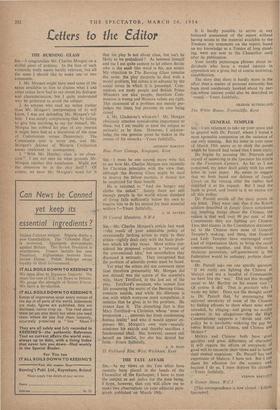&Hers fo the Editor
THE BURNING GLASS Sia,—I congratulate Mr. Charles Morgan on a skilful piece of polemic. In the face of such virtuosity truth seems hardly relevant, but all the same I should like to make one or two comments.
1. Mr. Morgan might have used some of the space available to him to discuss what I and other critics have had to say about his dialogue and characterisation, but I quite understand why he preferred to avoid the subject.
2. As anyone who read my notice (rather than Mr. Morgan's interpretation of it) will know, I was not defending Mr. Morgan's vil- lain. I was simply complaining that, by failing to give him anything to say for himself, Mr. Morgan has robbed his play of any interest it might have had as a discussion of the issue of Communism versus Democracy. The Communist case is never put, and Mr. Morgan's defence of Western Civilisation seems irrelevant in consequence.
3. " With Mr. Hartley, class is an obses- sion." I am not sure on what grounds Mr. Morgan reaches this conclusion. Might not the obsession he in the play itself ? Of course, we have Mr. Morgan's word for it
that his play is not about class, but isn't he likely to be prejudiced ? As between himself and me I am quite content to let others decide who is the snob (the word is his, not mine). My objection to The Burning Glass remains the same: the play purports to deal with a moral problem, but solves it in advance by the social terms in which it is presented. Com- munists are nasty people and British Prime Ministers are nice people, therefore Com- munism is wrong and Western values are right. This statement of a problem not merely pre- judges the issue, but prevents its ever being raised.
4. Mr. Gladstone's whiskers 1 Mr. Morgan obviously attaches considerable importance to these, but I am -unable to treat the subject as seriously as he does. However, I acknow- ledge the one genuine point he makes in the course of his remarks.—Yours faithfully,
ANTHONY HARTLEY Blue Peter Cottage, Kingsgate, Kent










































 Previous page
Previous page